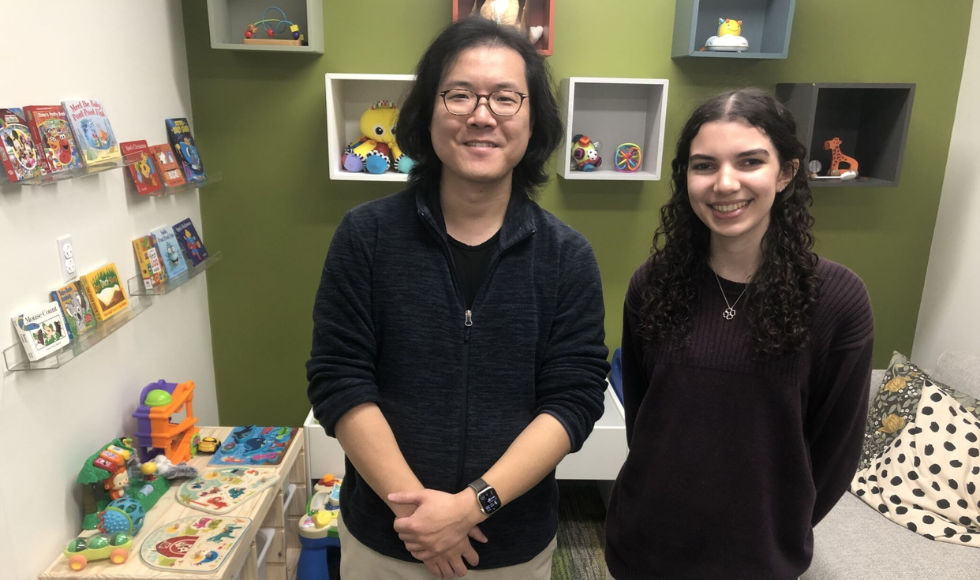Baby steps and mini-tasks: Undergrads grow into researchers at the Baby Lab

Assistant Professor Gabriel Xiao and fourth-year student Emma Resendes in the Baby Lab. Xiao’s lab explores how human cognition develops from infancy to early childhood, running research studies with nearly 400 infants and children every year.
BY Jay Robb, Faculty of Science
April 4, 2024
The website for Gabriel Xiao’s lab is likely the only one at McMaster to feature baby photos of the entire team.
And there are a lot of photos: Xiao has welcomed dozens of students into the Baby Lab.
He’s supervised more than 60 undergrads since joining the department of Psychology, Neuroscience & Behavior as an assistant professor in 2020.
The Baby Lab, on the third floor of the Psychology Building, currently has a postdoctoral fellow, three PhD students, a masters student and 30 undergraduate students.
Here, they explore how human cognition develops from infancy to early childhood, running research studies with nearly 400 infants and children every year.
And there are another 300 adult participants in other studies.
The department’s adoption of digitization and automation to streamline recruitment for studies has been a game changer for the lab, Xiao says.
The nature of his lab’s research creates loads of meaningful opportunities for undergrads.
“Our research, and development studies in general, depend on teamwork,” he says.
Everyone on the team has a key role to play. Students without research experience recruit study participants.
More experienced students run independent studies and even lead their own research teams.
That’s how fourth-year student and lab manager Emma Resendes spent her past summer. She replicated a study conducted remotely during COVID that looked at how environmental circumstances influence perceptual development in infants.
“I got to wear many hats from recruiter and experimenter to trainer, coder and data organizer,” Resendes says.
She was in her second year at Mac when she joined Baby Lab in 2022. Level II Psychology, Neuroscience & Behaviour students can apply for introductory independent studies in department labs. Baby Lab stood out for Resendes.
She’d previously worked with children and youth with disabilities. Those experiences sparked her curiosity about how children learn, develop, adapt to different environments and perceive the world around them. Baby Lab would let her do a deep dive into that research.
Working with babies has made her a better researcher, she says:
“Babies aren’t always the most reliable study participants” — a polite way of saying hungry and overtired babies are prone to meltdowns.
Short attention spans and rapidly changing moods can pose unique challenges when running studies.
“Every baby comes into the lab with a unique personality and temperament. You have to learn how to adjust and adapt.”
But there are perks: “Babies are extremely cute and I get to play with them between classes.”
Besides spending time with babies and their caregivers, Resendes says the best part of the lab has been the spirit of camaraderie.
“From Day 1, Baby Lab’s been such a collaborative and supportive environment. Everyone’s deeply committed to the success of whatever they’re working on.”
That shared commitment can be attributed to Xiao’s “Get your hands dirty” approach to learning.
“It’s such an effective way to motivate students to learn and explore.”
And it’s okay if that exploration doesn’t pan out. “We encourage students to make mistakes as long as none of the equipment breaks. Admitting that no one is perfect opens up so many doors to learn from one another.”
Xiao puts students to work by serving up mini-tasks. He breaks big projects into smaller, more manageable assignments. Those mini-tasks are then posted on the lab’s Teams channel and open to any and all students who might be interested.
It’s a system that’s paid dividends. “Over the years, we’ve used mini-tasks to discover new software pipelines, build neuroimaging caps, make lab logos and proofread manuscripts.”
It’s not enough to give students meaningful work, says Xiao: They also deserve recognition for supporting research excellence.
Every time the lab publishes a paper, students are recognized for their contributions, even if it’s for helping with proofreading. When studies are submitted to conferences, undergrads are added to the author list.
One of the lab’s undergraduate studies is about to be accepted in the Journal of Experimental Child Psychology with a past undergraduate honours thesis student as the first author. More undergrad projects are in the middle of the reviewing process or in the writing stage, says Xiao.
After three years in the Baby Lab, Resendes is off to York University in the fall to earn her masters in clinical developmental psychology.
“The Baby Lab ignited my passion for research. The more I learned, the less I knew and wanted to find out. I wouldn’t be where I am today as a student or researcher without the Baby Lab and Dr. Xiao’s supervision. I’m so lucky and grateful to have worked here.”
The feeling’s mutual. Xiao says losing Resendes will definitely hurt — “Emma will be missed by everyone in the lab” — but he was thrilled and honoured to write her a glowing reference letter for graduate school.
She’s set a high bar for the next lab manager.
For Xiao, watching students like Resendes come into their own as researchers is the most rewarding part of running Baby Lab.
It’s gratifying to know that his lab delivers a great learning and research experience for students, he says. “Even better is knowing that students are supporting each other to be so successful. I play just a small part.”


